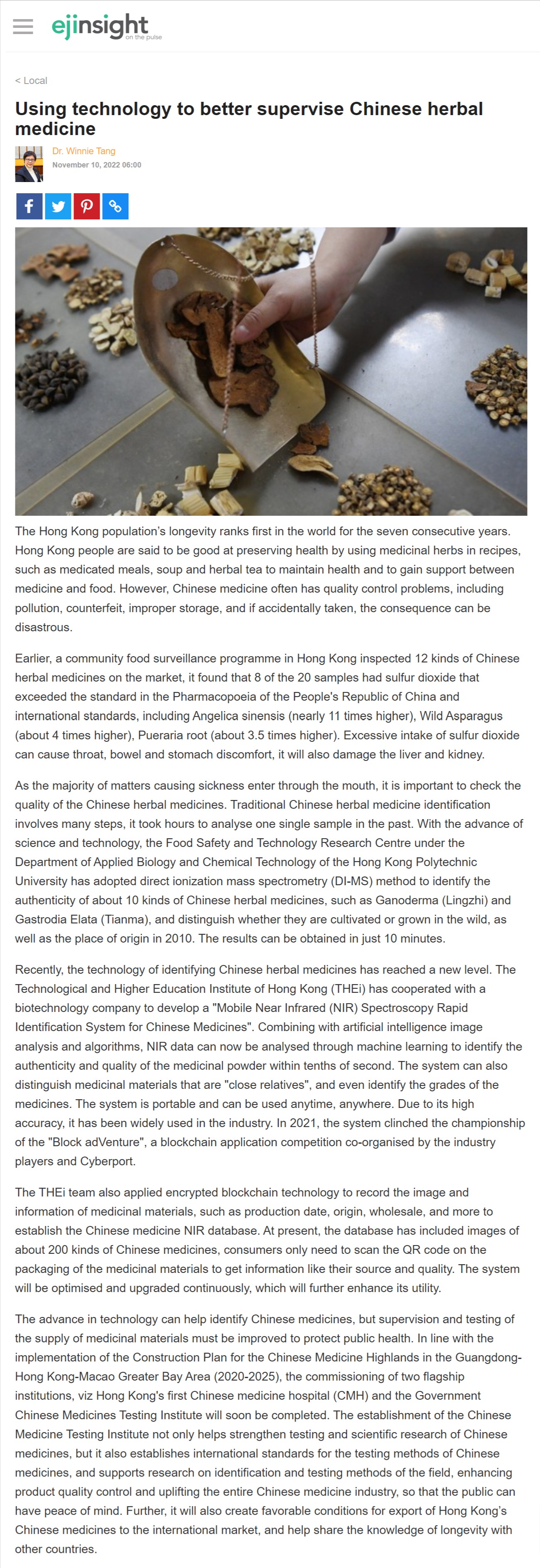網上版請按此

Using technology to better supervise Chinese herbal medicine
The Hong Kong population's longevity ranks first in the world for the seven consecutive years. Hong Kong people are said to be good at preserving health by using medicinal herbs in recipes, such as medicated meals, soup and herbal tea to maintain health and to gain support between medicine and food. However, Chinese medicine often has quality control problems, including pollution, counterfeit, improper storage, and if accidentally taken, the consequence can be disastrous.
Earlier, a community food surveillance programme in Hong Kong inspected 12 kinds of Chinese herbal medicines on the market, it found that 8 of the 20 samples had sulfur dioxide that exceeded the standard in the Pharmacopoeia of the People's Republic of China and international standards, including Angelica sinensis (nearly 11 times higher), Wild Asparagus (about 4 times higher), Pueraria root (about 3.5 times higher). Excessive intake of sulfur dioxide can cause throat, bowel and stomach discomfort, it will also damage the liver and kidney.
As the majority of matters causing sickness enter through the mouth, it is important to check the quality of the Chinese herbal medicines. Traditional Chinese herbal medicine identification involves many steps, it took hours to analyse one single sample in the past. With the advance of science and technology, the Food Safety and Technology Research Centre under the Department of Applied Biology and Chemical Technology of the Hong Kong Polytechnic University has adopted direct ionization mass spectrometry (DI-MS) method to identify the authenticity of about 10 kinds of Chinese herbal medicines, such as Ganoderma (Lingzhi) and Gastrodia Elata (Tianma), and distinguish whether they are cultivated or grown in the wild, as well as the place of origin in 2010. The results can be obtained in just 10 minutes.
Recently, the technology of identifying Chinese herbal medicines has reached a new level. The Technological and Higher Education Institute of Hong Kong (THEi) has cooperated with a biotechnology company to develop a "Mobile Near Infrared (NIR) Spectroscopy Rapid Identification System for Chinese Medicines". Combining with artificial intelligence image analysis and algorithms, NIR data can now be analysed through machine learning to identify the authenticity and quality of the medicinal powder within tenths of second. The system can also distinguish medicinal materials that are "close relatives", and even identify the grades of the medicines. The system is portable and can be used anytime, anywhere. Due to its high accuracy, it has been widely used in the industry. In 2021, the system clinched the championship of the "Block adVenture", a blockchain application competition co-organised by the industry players and Cyberport.
The THEi team also applied encrypted blockchain technology to record the image and information of medicinal materials, such as production date, origin, wholesale, and more to establish the Chinese medicine NIR database. At present, the database has included images of about 200 kinds of Chinese medicines, consumers only need to scan the QR code on the packaging of the medicinal materials to get information like their source and quality. The system will be optimised and upgraded continuously, which will further enhance its utility.
The advance in technology can help identify Chinese medicines, but supervision and testing of the supply of medicinal materials must be improved to protect public health. In line with the implementation of the Construction Plan for the Chinese Medicine Highlands in the Guangdong-Hong Kong-Macao Greater Bay Area (2020-2025), the commissioning of two flagship institutions, viz Hong Kong's first Chinese medicine hospital (CMH) and the Government Chinese Medicines Testing Institute will soon be completed. The establishment of the Chinese Medicine Testing Institute not only helps strengthen testing and scientific research of Chinese medicines, but it also establishes international standards for the testing methods of Chinese medicines, and supports research on identification and testing methods of the field, enhancing product quality control and uplifting the entire Chinese medicine industry, so that the public can have peace of mind. Further, it will also create favorable conditions for export of Hong Kong's Chinese medicines to the international market, and help share the knowledge of longevity with other countries.
Dr. Winnie Tang
Adjunct Professor, Department of Computer Science, Faculty of Engineering; Department of Geography, Faculty of Social Sciences; and Faculty of Architecture, The University of Hong Kong